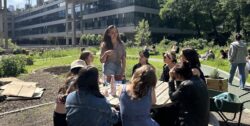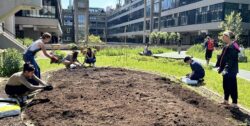Using Indigenous Practices to Inform Sustainable Food Planting on Campus

Student Sustainability Architect, Julie Mathes, has been running monthly gardening workshops in the Sustainable Garden over the past few months.
Last month, the workshop started with a collaborative discussion on indigenous agricultural techniques, and was followed by an opportunity to use the Three Sisters planting method to plant corn, squash and beans.
We chatted to Julie about the session to find out more.
Why are indigenous practices important?
Indigenous land covers less than 22% of the world’s terrestrial area but accounts for over 80% of all biodiversity. This abundance of diversity and interspecies relationships within indigenous food methods makes them extremely resilient, as they are less likely to be wiped out by one environmental event.
Indigenous communities all around the world, from the Himalayas to the Sahel, to the Amazon, to the Arctic, prove to have one of the most sustainable and resilient food systems. This food system is based on knowledge that was passed from generation to generation and adapted to seasonality and the natural cycles of their surroundings. These indigenous practices and knowledge have shaped our agricultural system; however, this is unfortunately lost with industrial farming and intensive agriculture, leading to climate change, biodiversity loss, soil degradation, nutritional value reduction, food insecurity and inequality.
What is Permaculture?
Permaculture, a fusion of ‘permanent’ and ‘agriculture’, has evolved as a practice to tackle these challenges associated with intensive agriculture. The Australian academic Bill Mollison, co-founder of the concept of permaculture, based a lot of his knowledge on practices from the Aboriginals and other indigenous communities around the world.
Central to permaculture are the three ethics: Earth Care, People Care, Fair Share. These are also core values in most indigenous communities. As can be found in Robin Wall Kimmerer’s book ‘Braiding Sweetgrass,’ who highlights that in indigenous cultures gifts are shared and the focus is first on giving, followed with receiving. This is not only applicable to our relationship with nature but also our relationship with each other.
Nowadays, we are increasingly disconnected from this knowledge, our relationship with food and the process of growing. This disconnection forms the reason for a Sustainable Garden workshop: to educate students and staff on our food system and the importance of integrating indigenous values and practices.

How do we implement these indigenous methods?
Four main lessons to learn from indigenous communities
- The importance of considering the landscape as a whole, rather than dividing it into separate units
- Valuing diversity and biodiversity (i.e., fostering crop diversity does not only benefit the soil and wildlife but is also crucial for climate change resilience)
- 3. Practicing reciprocity (i.e., see concept of the honorable harvest)
- Sharing knowledge across generations
The Three Sisters technique:
These lessons all come together in the Three Sister Planting technique that we practiced in the garden. Indigenous communities in North America plant the three sisters – corn, beans, squash – since the 1300s. The corn is planted first and provides support to the younger sister, the beans. The beans grow around the corn, focusing on leaf growth and are important for soil health, adding nitrogen to it. Lastly, the squash extends over the ground, keeping the moisture in the soil for its other two sisters and given its bristly leaves it keeps away pests and insects from attacking the other.
Growing the three sisters does not only provide us with great nutritious value and health benefits, but it also nurtures our soil and illustrates a relationship that is based on reciprocity. As Robin Wall Kimmerer puts it: “Being among the sisters provides a visible manifestation of what a community can become when its members understand and share their gifts.”

For more information and updates on the sustainability events we have coming up, follow our Eventbrite.
Keep up to date on the latest news
-
-
- Follow us on Twitter: @UoL_Sus
- Follow us on Instagram: @uol_sus
- Follow us on Facebook: @UoLSustainability
- Sign up to our Sustainability newsletter
-
United Nations Sustainable Development Goals
 We use the United Nations Sustainable Development Goals (SDGs) as a framework to guide our activity. Our work on Student Citizenship links to all of the SDGs.
We use the United Nations Sustainable Development Goals (SDGs) as a framework to guide our activity. Our work on Student Citizenship links to all of the SDGs.
Find out more about our impact on the SDGs.
